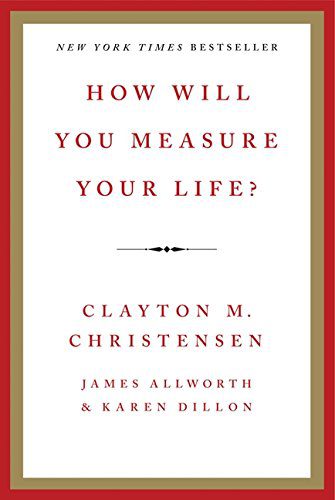Print | Kindle(eBook) | Audiobook
A few weeks before the end of the fall semester in 2009, New York Times bestselling author of The Innovator’s Dilemma, Clayton M. Christensen, learned that he had cancer similar to the one that had killed his dad. He shared the news with his students at the Harvard Business school, and he also informed them that his cancer ( follicular lymphoma) might not respond to the available therapies.
In How Will You Measure Your Life? Christensen shared insights and observations about life and business. His core message is for his students and readers to pursue purpose and meaning in their careers and relationships.
Favourite Takeaways – How Will You Measure Your Life?
The only way to be truly satisfied is to do what you believe is great work. And the only way to do great work is to love what you do. If you haven’t found it yet, keep looking. Don’t settle. As with all matters of the heart, you’ll know when you find it. —Steve Jobs
Finding Happiness
WHEN YOU WERE ten years old and someone asked you what you wanted to be when you grew up, anything seemed possible. Astronaut. Archaeologist. Fireman. Baseball player. The first female president of the United States. Your answers then were guided simply by what you thought would make you really happy. There were no limits.
There are a determined few who never lose sight of aspiring to do something that’s truly meaningful to them. But for many of us, as the years go by, we allow our dreams to be peeled away. We pick our jobs for the wrong reasons and then we settle for them. We begin to accept that it’s not realistic to do something we truly love for a living.
“Too many of us who start down the path of compromise will never make it back. Considering the fact that you’ll likely spend more of your waking hours at your job than in any other part of your life, it’s a compromise that will always eat away at you.”
Hygiene and Motivation Factor
Hygiene factors are things like status, compensation, job security, work conditions, company policies, and supervisory practices. It matters, for example, that you don’t have a manager who manipulates you for his own purposes—or who doesn’t hold you accountable for things over which you don’t have responsibility. Bad hygiene causes dissatisfaction. You have to address and fix bad hygiene to ensure that you are not dissatisfied in your work.
“Compensation is a hygiene factor. You need to get it right. But all you can aspire to is that employees will not be mad at each other and the company because of compensation.”
Motivation factors include challenging work, recognition, responsibility, and personal growth. Feelings that you are making a meaningful contribution to work arise from intrinsic conditions of the work itself. Motivation is much less about external prodding or stimulation, and much more about what’s inside of you, and inside of your work.
The Money Trap
“The point isn’t that money is the root cause of professional unhappiness. It’s not. The problems start occurring when it becomes the priority over all else, when hygiene factors are satisfied but the quest remains only to make more money. Even those engaged in careers that seem to specifically focus on money, like salespeople and traders, are subject to these rules of motivation—it’s just that in these professions, money acts as a highly accurate yardstick of success. Traders, for example, feel success and are motivated by being able to predict what is going to happen in the world and then making bets based on those predictions. Being right is almost directly correlated with making money; it is the confirmation that they are doing their jobs well, the measure they use to compete on.
Similarly, salespeople feel success by being able to convince customers that the product or service they’re selling will help those customers in their lives. Again, money directly correlates with success—a sale. It’s an indicator for how well they’re doing their jobs. It’s not that some of us are fundamentally different beasts—we might find different things meaningful or enjoyable—but the theory still works the same way for everyone.
If you get motivators at work, Herzberg’s theory suggests, you’re going to love your job—even if you’re not making piles of money. You’re going to be motivated.
The Balance of Calculation and Serendipity
Understanding what makes us tick is a critical step on the path to fulfillment. But that’s only half the battle. You actually have to find a career that both motivates you and satisfies the hygiene factors. If it were that easy, however, wouldn’t each of us already have done that? Rarely is it so simple. You have to balance the pursuit of aspirations and goals with taking advantage of unanticipated opportunities. Managing this part of the strategy process is often the difference between success and failure for companies; it’s true for our careers, too.
Deliberate and Emergent Opportunities
In our lives and in our careers, whether we are aware of it or not, we are constantly navigating a path by deciding between our deliberate strategies and the unanticipated alternatives that emerge. Each approach is vying for our minds and our hearts, making its best case to become our actual strategy. Neither is inherently better or worse; rather, which you should choose depends on where you are on the journey. Understanding this—that strategy is made up of these two disparate elements, and that your circumstances dictate which approach is best—will better enable you to sort through the choices that your career will constantly present.
Strategy almost always emerges from a combination of deliberate and unanticipated opportunities. What’s important is to get out there and try stuff until you learn where your talents, interests, and priorities begin to pay off. When you find out what really works for you, then it’s time to flip from an emergent strategy to a deliberate one.
Your Strategy Is Not What You Say It Is
You can talk all you want about having a strategy for your life, understanding motivation, and balancing aspirations with unanticipated opportunities. But ultimately, this means nothing if you do not align those with where you actually expend your time, money, and energy.
In other words, how you allocate your resources is where the rubber meets the road.
Real strategy—in companies and in our lives—is created through hundreds of everyday decisions about where we spend our resources. As you’re living your life from day to day, how do you make sure you’re heading in the right direction? Watch where your resources flow. If they’re not supporting the strategy you’ve decided upon, then you’re not implementing that strategy at all.
Capabilities
The factors that determine what a company can and cannot do—its capabilities—fall into one of three buckets: resources, processes, and priorities.
Capabilities are dynamic and built over time; no company starts out with its capabilities fully developed. The most tangible of the three factors is resources, which include people, equipment, technology, product designs, brands, information, cash, and relationships with suppliers, distributors, and customers.
Resources are usually people or things—they can be hired and fired, bought and sold, depreciated or built. Many resources are visible and often are measurable, so managers can readily assess their value. Most people might think that resources are what make a business successful.
Processes include the ways that products are developed and made, and the methods by which market research, budgeting, employee development, compensation, and resource allocation are accomplished. Unlike resources, which are often easily seen and measured, processes can’t be seen on a balance sheet.
Priorities – This set of factors defines how a company makes decisions; it can give clear guidance about what a company is likely to invest in, and what it will not. Employees at every level will make prioritization decisions—what they will focus on today, and what they’ll put at the bottom of their list.
The safest road to Hell is the gradual one-the gentle slope, soft underfoot, without sudden turnings, without milestones, without signposts. —C. S. Lewis
Just This Once
Most of us think that the important ethical decisions in our lives will be delivered with a blinking red neon sign: CAUTION: IMPORTANT DECISION AHEAD. Never mind how busy we are or what the consequences might be. Almost everyone is confident that in those moments of truth, he or she will do the right thing. After all, how many people do you know who believe they do not have integrity?
The problem is, life seldom works that way. It comes with no warning signs. Instead, most of us will face a series of small, everyday decisions that rarely seem like they have high stakes attached. But over time, they can play out far more dramatically.
It happens exactly the same way in companies. No company deliberately sets out to let itself be overtaken by its competitors. Rather, they are seemingly innocuous decisions that were made years before that led them down that path.
100 Percent of the Time Is Easier Than 98 Percent of the Time
“Many of us have convinced ourselves that we are able to break our own personal rules “just this once.” In our minds, we can justify these small choices. None of those things, when they first happen, feels like a life-changing decision. The marginal costs are almost always low. But each of those decisions can roll up into a much bigger picture, turning you into the kind of person you never wanted to be. That instinct to just use the marginal costs hides from us the true cost of our actions.”
The first step down that path is taken with a small decision. You justify all the small decisions that lead up to the big one and then you get to the big one and it doesn’t seem so enormous anymore. You don’t realize the road you are on until you look up and see you’ve arrived at a destination you would have once considered unthinkable.
“If you give in to “just this once,” based on a marginal-cost analysis, you’ll regret where you end up. ”
it’s easier to hold to your principles 100 percent of the time than it is to hold to them 98 percent of the time. The boundary—your personal moral line—is powerful, because you don’t cross it; if you have justified doing it once, there’s nothing to stop you doing it again.
Decide what you stand for. And then stand for it all the time.
All the Best in your quest to get Better. Don’t Settle: Live with Passion.



1 Comment
Pingback: 50 Audiobooks Listening Challenge 2021. – Lanre Dahunsi